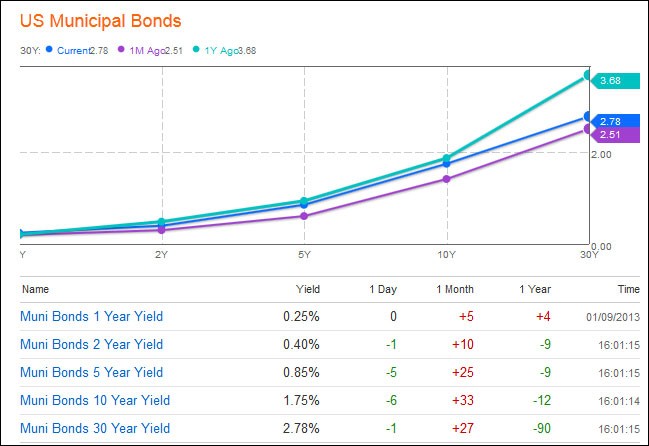Government and Municipal Bonds
Post on: 16 Март, 2015 No Comment

U.S. Government Bonds
U.S. government securities include Treasury bills, notes, and bonds. Treasury bills are short-term obligations (mostly with 13-, 26-, and 52-week maturities) sold by the federal government through competitive bidding. Bills are generally issued in $10,000 minimum denominations, then in $5,000 increments above $10,000. These bills are sold for less than their face value, the discount representing the interest. In this respect, these bills are similar to the Series EE Savings Bonds, which are also sold at a discount but are paid off at full face value at maturity. Treasury notes may run up to 7 years, while Treasury bonds typically have maturities ranging from 5 years to 30 years. Interest income on debt obligations of the federal government is typically exempt from state and local income taxes, but is subject to federal taxes. The relatively low credit risk of government securities, plus their favorable tax treatment, causes them to generally provide a lower pretax yield than that of corporate fixed-income securities with similar maturities.
Municipal Bonds
Municipal Bonds (Securities) are issued by a state or local government. They are debt instruments. The funds go to either support a government’s general financing needs or for special projects. Municipal bonds are free from federal tax on the accrued interest and also free from state and local taxes if they are issued in the state of residence. For example, a resident of New York who buys a municipal bond issued by the state of New York, will not pay New York State or local taxes on it. However, if the same resident of New York buys a municipal bond from a city in Connecticut, will pay state and local tax on the accrued interest. Keep in mind that any profit realized from the purchase or sale is not exempt from tax. Only the accrued interest is tax exempt. The U.S. government’s Federal Reserve system brings U.S. government, Treasury bonds issues public. There is no agency that handles municipal bond issues. However, there are brokerage firms which specialize in bringing out municipal bond issues.
There are several types of municipal bonds. They are: General Obligation Bonds, Limited and Special Tax Bonds, Industrial Revenue Bonds, Housing Bonds, Moral Obligation Bonds, Double Barreled Bonds, Tax Anticipation Notes, Bond Anticipation Notes, and Revenue Anticipation Notes. These are described below.
General Obligation Bonds (GO’s)
General Obligation Bonds are backed by the full faith and credit of the issuer for prompt payment of principal and interest. Many bonds issued by city, county, or school district, also have the added security that they have can raise property taxes to assure payment. This guarantee is of an unlimited nature. The issuer can raise taxes as high as they want to pay the bonds. If the property tax is not paid, the property can be sold at auction giving the bond holder a superior claim above mortgages, mechanical liens, and other encumbrances. General Obligation bonds are usually analyzed in terms of the size of the taxable resources. These bonds are regarded as very safe.
Limited and Special Tax Bonds
These bonds are payable from a pledge of the proceeds against a specific tax. This tax could be a gasoline tax, a special assessment, or ad valorem tax levied at a fixed price. Unlike General Obligation bonds and their unlimited ability to raise taxes, with these bonds, the issuer is limited as to its source for the revenue to pay the bonds. These bonds are quite safe.
Revenue Bonds
These are payable from the earnings of a revenue producing agency or enterprise. Examples are water, sewer, school district, airport, etc. States and their sub-divisions create certain agency’s and authorities to perform specific tasks. Many times, the agency or authority has the ability to levy charges and fees for its services (e.g. the water company). These bonds are analyzed in terms of historical or potential earnings compared with the bond requirements. Usually, the yield is higher than that of a general obligation bond. This is because taxes are more secure than revenues. These bonds have built up a good record over a long period of time.
Industrial Revenue Bonds
The local community creates an Industrial Development Agency. Most larger communities have one form of this. The purpose of the agency is to develop industrial or commercial property for the benefit of private users. The agency raises revenue for this by issuing municipal bonds. The money raised from this type of bond issue is used to pay for the construction of the new facilities. The facilities are then leased to the corporate guarantor. The safety of an Industrial Revenue bond depends on the credit worthiness of the corporate guarantor.
Bond Anticipation Noted (BAN’s)
These are issued when revenue is anticipated from a bond issue. To avoid poor market conditions, an issuer might delay a bond issue. Or, the issuer might want to combine several projects into one larger issue. During this process, they issue the BAN’s.
Housing Bonds

Housing bonds are issued by both state and local governments. They are secured by mortgage repayments on single family homes. Added protections come from, federal subsidies for low income families, FHA insurance, VA guarantees, and private mortgage insurance. PHA’, which are Public Housing Authority issues are no longer available. However, some do trade in the secondary market. PHA’s are backed by the full faith and credit of the U.S. government.
Double Barreled Bonds
These are tax exempt bonds which are backed by a pledge of two or more sources. These are quite like general obligation bonds which are additionally backed by a second source of revenue. This usually increases their safety.
Municipal Notes are short term debt instruments issued by state and local authorities. Their maturities run from about 60 days to one year. They are usually available in denominations of about $25,000. A municipality uses this type of financing as an interim step in anticipation of future revenue.
Tax Anticipation Noted (TAN’s)
These are issued by cities in anticipation of future tax revenue. The security of the issue depends on the security and amount of the tax revenue the municipality intends to receive. Usually, these funds are used to finance current obligations.
Revenue Anticipation Notes (RAN’s)
These are issued in anticipation of revenue coming in from the federal government. Or if a local municipality issues them, they may be waiting for revenue from the state or federal government.














